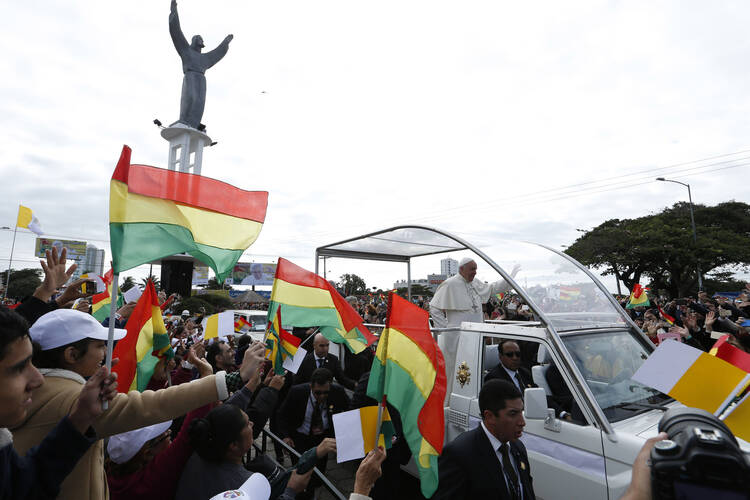To paraphrase a joke that circulates in Jesuit circles: Pope Francis is the best at humility. He proved it again on his plane ride home from South America when he frankly acknowledged that “it was an error of mine” not to have said more about the struggles of the world’s middle class. A sharply worded criticism of unfettered capitalism in Bolivia had been only his most recent denunciation of a throwaway economy and a demand for greater systemic attention to the continuing plight of the world’s poor.
During one of the off-the-papal-cuff news conferences that have become a hallmark of his pontificate, Pope Francis explained to reporters because the poor are at the “heart of the Gospel” they enjoy a preferential option for his attention.
But he also thanked a reporter for reminding him of his duty as well to advocate on behalf of the global middle class, and he assured that he would turn his attention to their concerns after proper Jesuitical due diligence of study and reflection.
While most may think a fellow like Francis could fall back on the purported infallibility of his office, this pontiff seems completely at ease with the fully human capacity to make a mistake and to accept corrections—even from as unlikely a source as a plane-load of reporters.
It was hardly his most significant apology that week, however. In the same speech in Bolivia, in fact, he followed up on a previous apology from Pope John Paul II to more humbly express regret for church transgressions against the native people of the new world.
His remarks in Latin America preview what are likely to be the major concerns of his unprecedented address before Congress in September. Those whose hearts beat a little faster during bedtime stories of 19th century laissez faire capitalism should buckle up when Francis comes to Washington. “An unfettered pursuit of money rules,” he said in Bolivia, leading to a benighted planet, poisoned with the “dung of the devil.” Not exactly subtle. But sometimes Pope Francis has to play prophet and say the hard things that might awaken first world consciences.
Read the rest at the Washington Post: "Pope Francis is not a Marxist, but make no mistake: He will challenge the world’s leading capitalist power."








